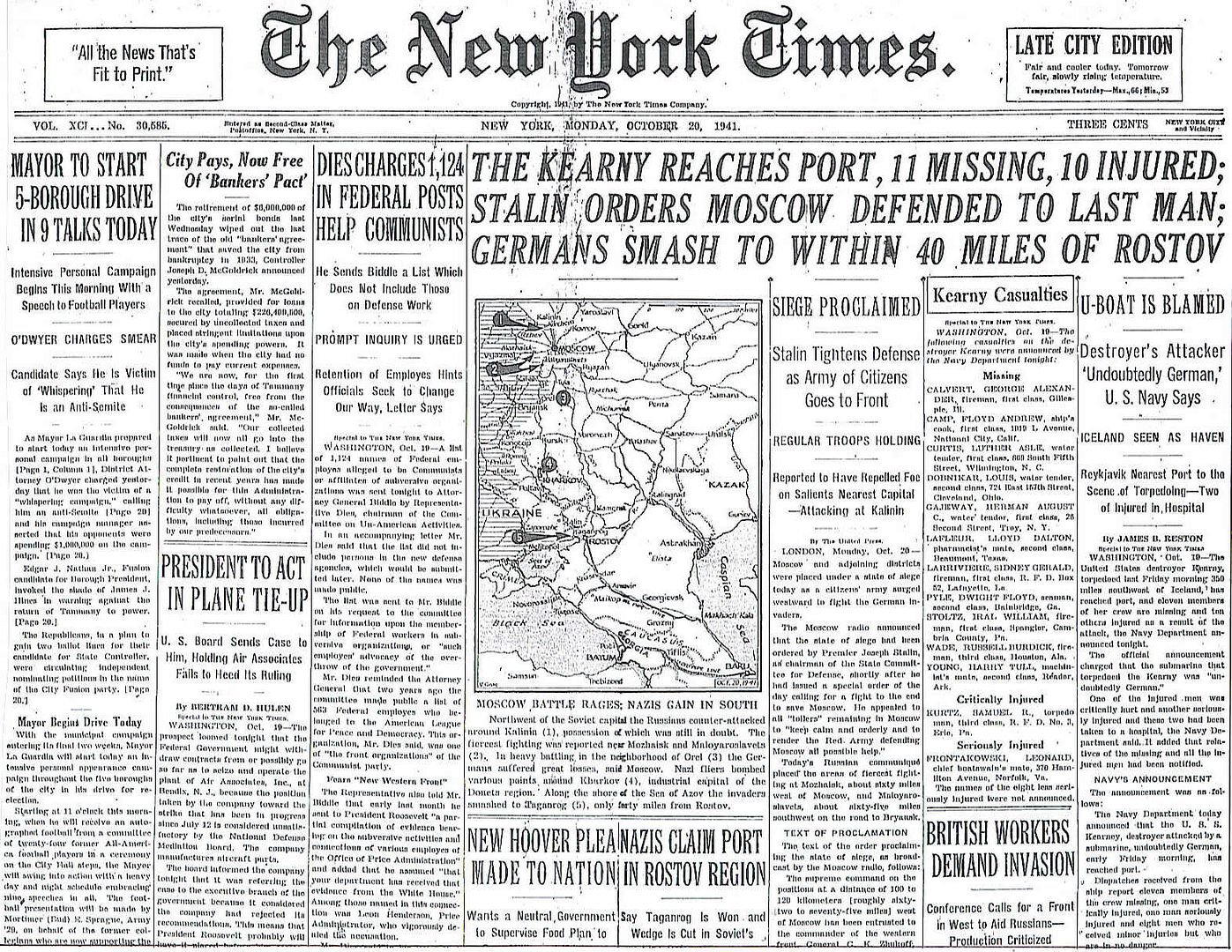
Posted on 10/20/2011 4:57:30 AM PDT by Homer_J_Simpson

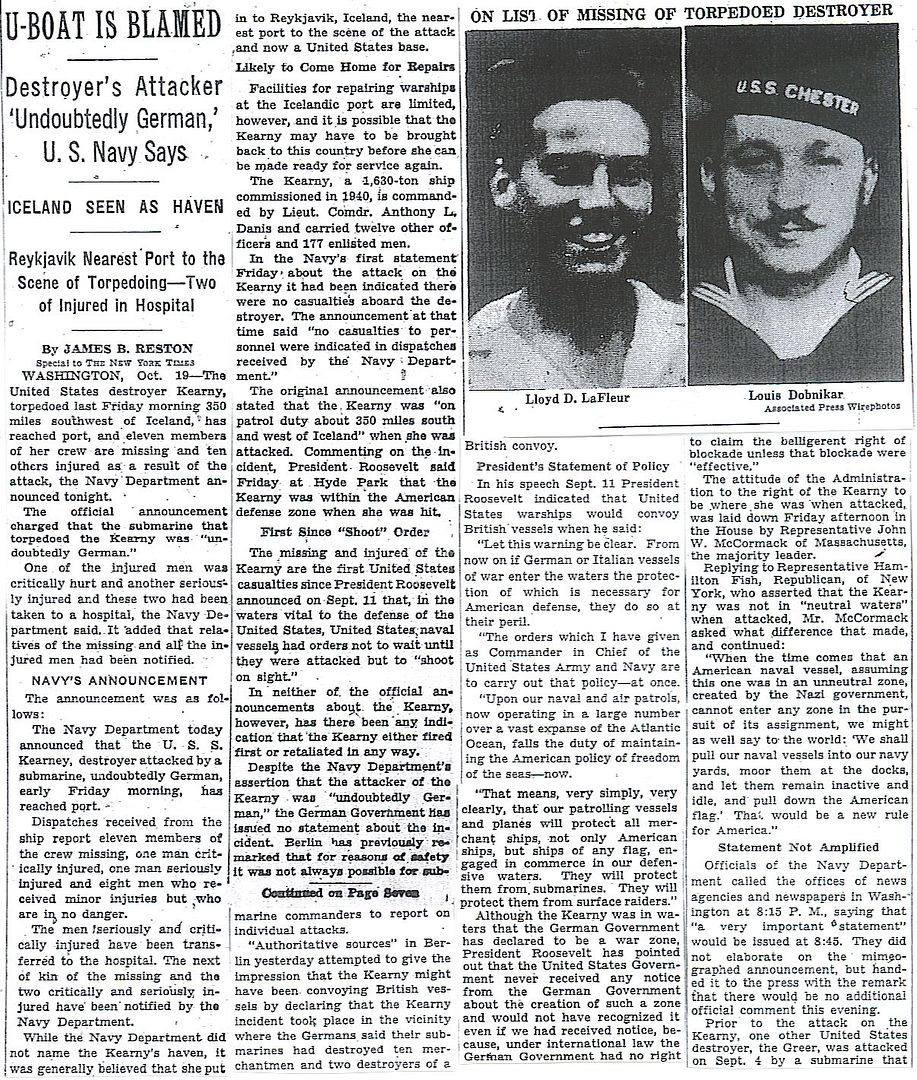
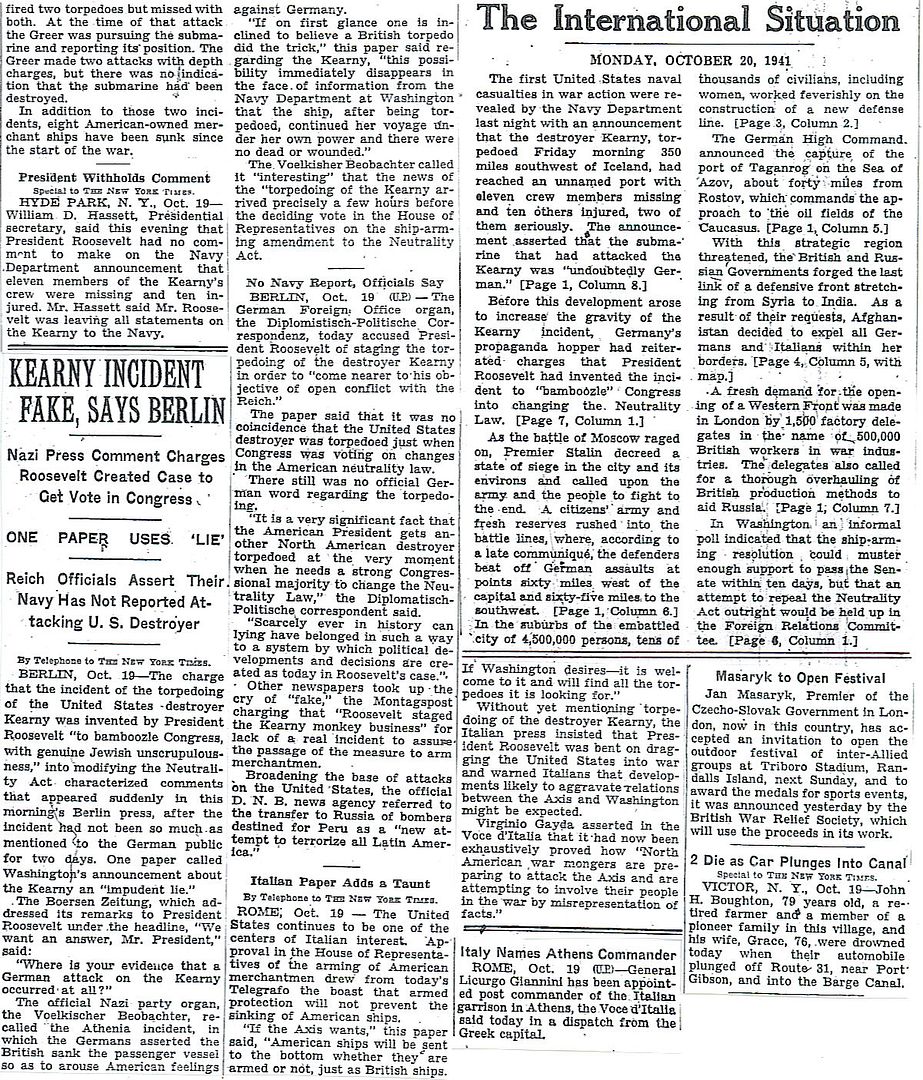
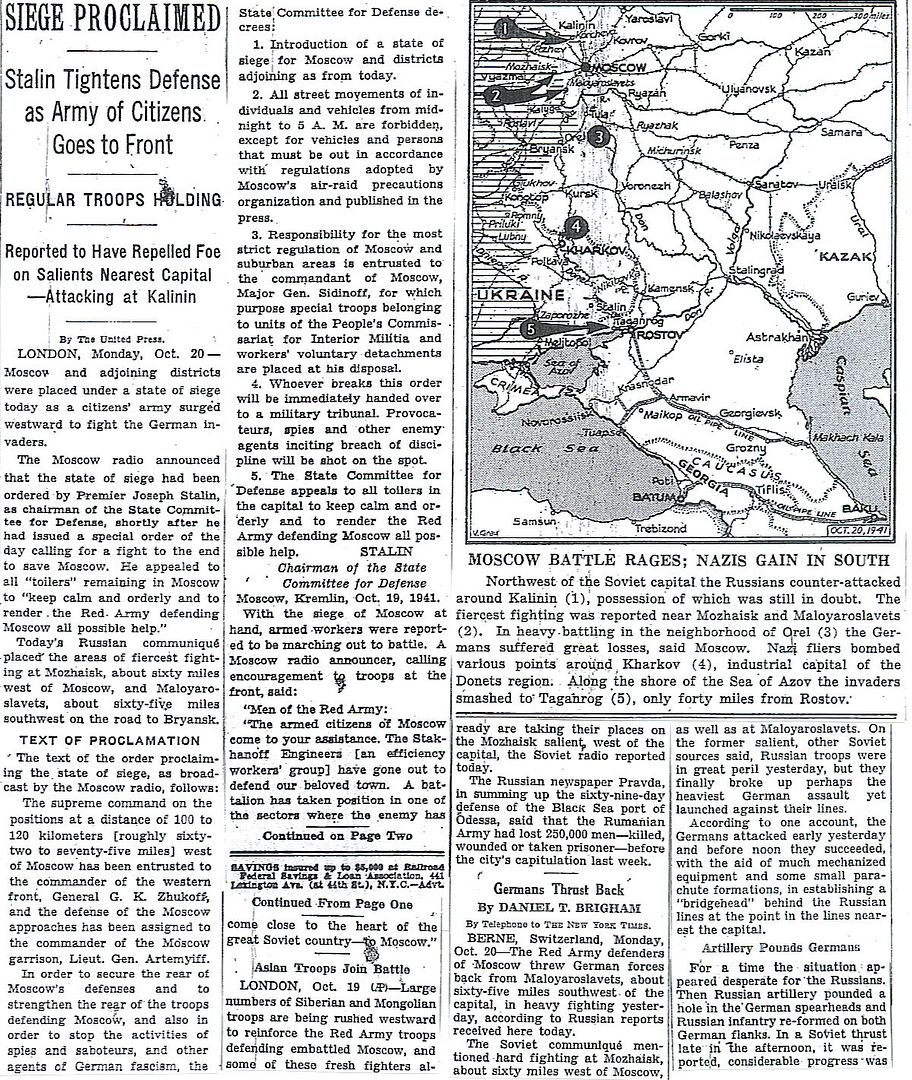
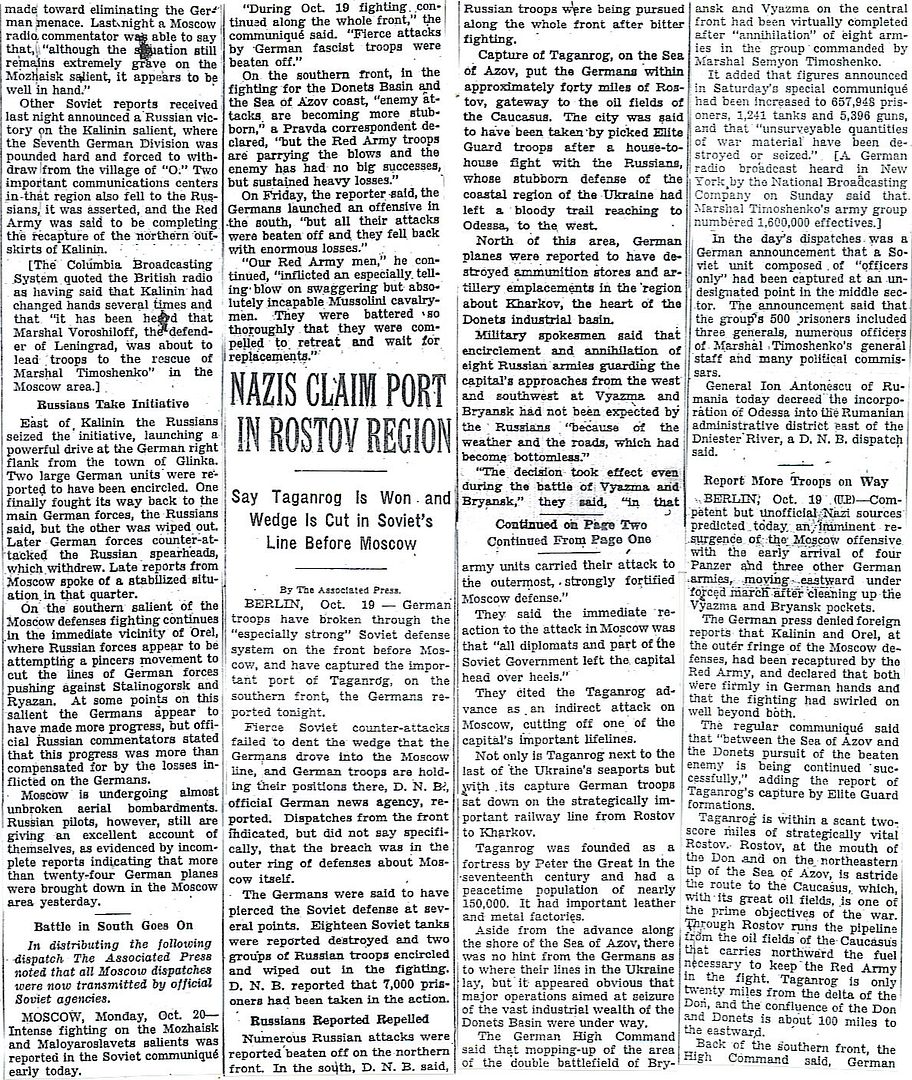
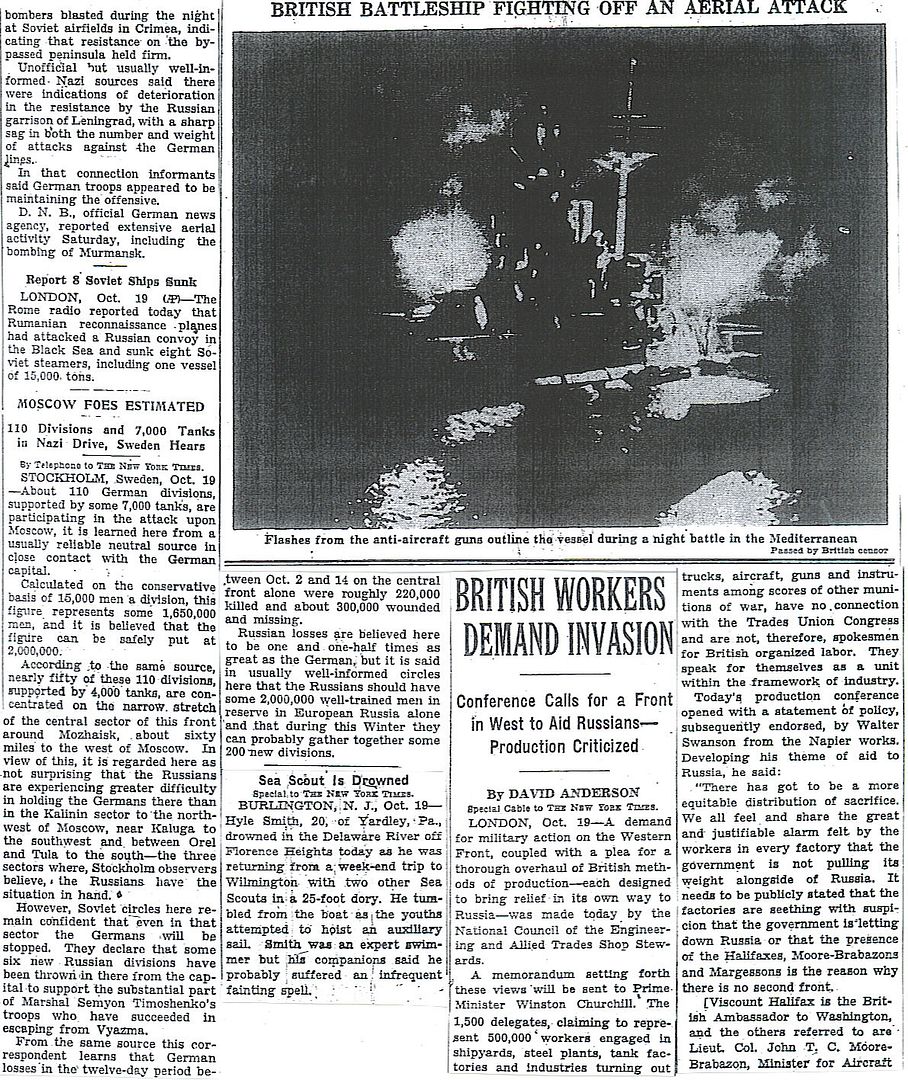
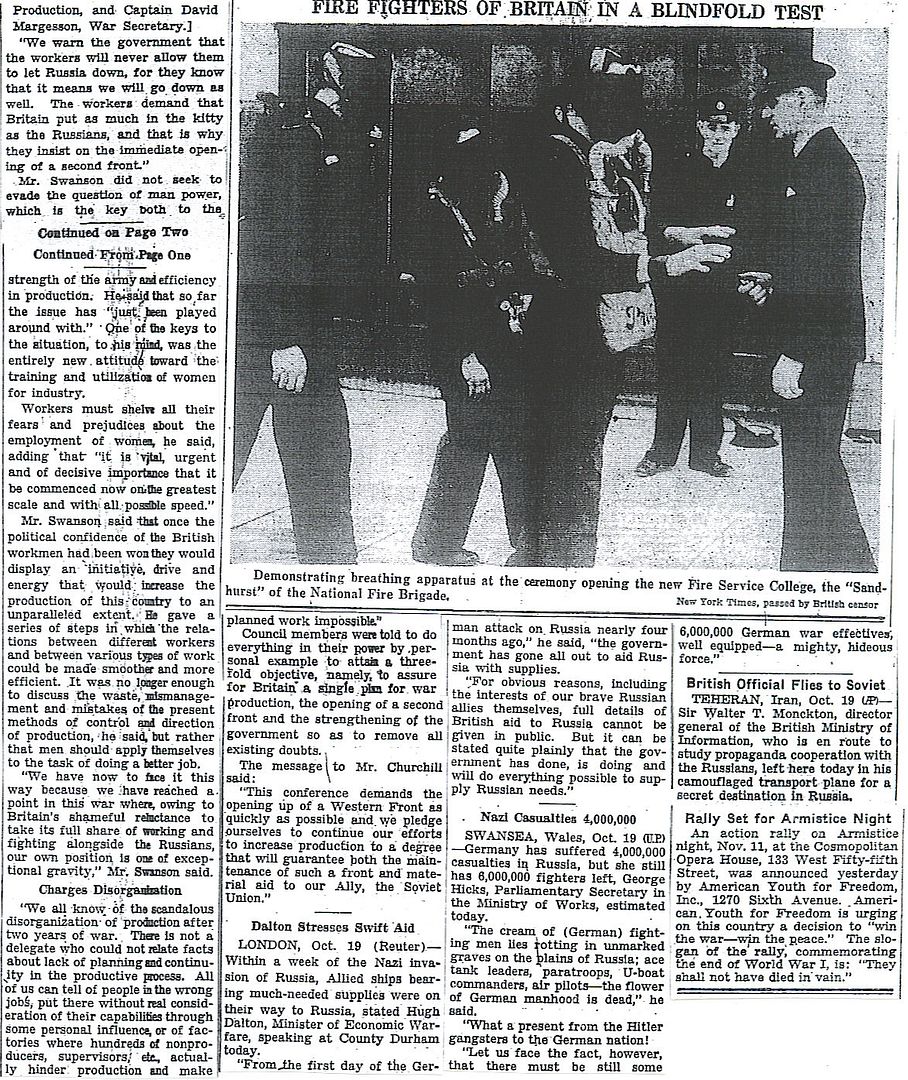
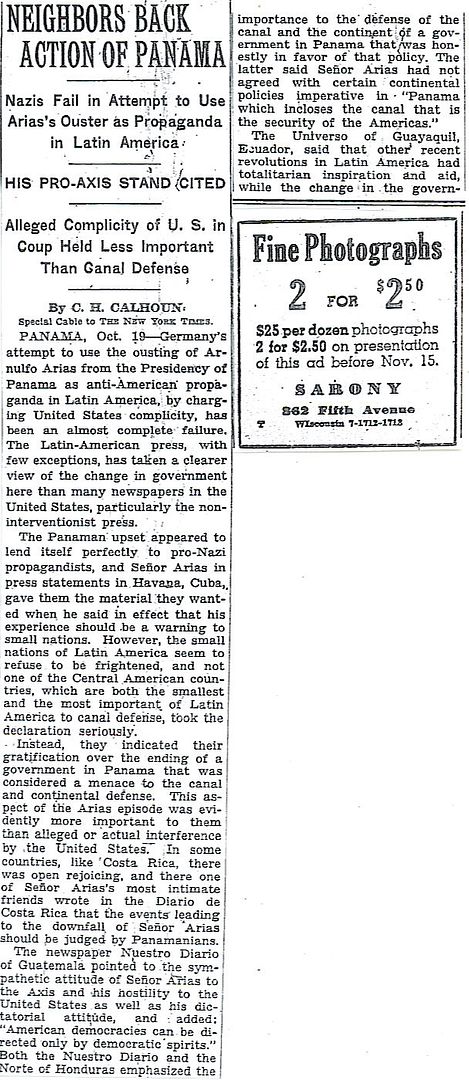
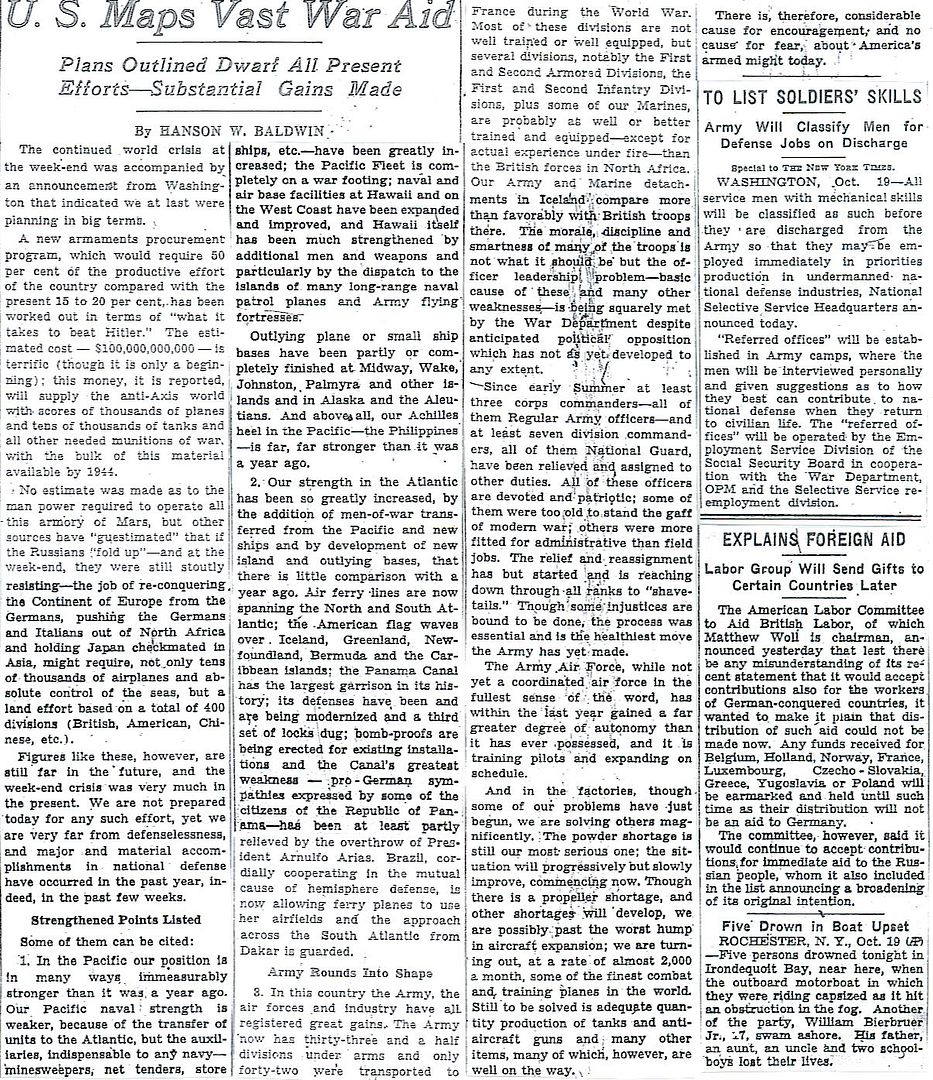
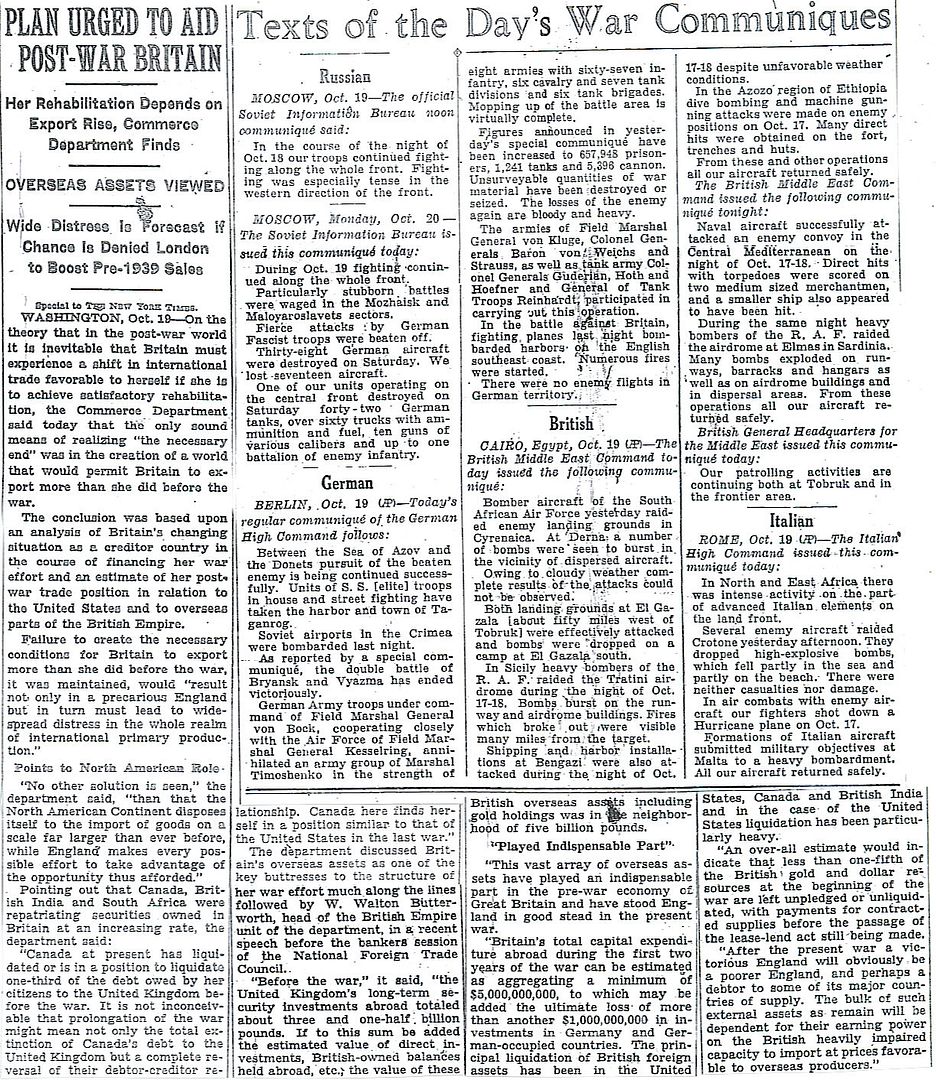
http://www.onwar.com/chrono/1941/oct41/f20oct41.htm
Soviets resist German attacks
Monday, October 20, 1941 www.onwar.com
On the Eastern Front... Heavy fighting continues between Soviet and German forces in the area of Moscow around Mozhaysk and at Malayroslavets. In the south, German forces penetrate Stalino.
In Occupied France... The German commander in Nantes is shot by French resistance members. Fifty hostages are shot in reprisal.
http://homepage.ntlworld.com/andrew.etherington/month/thismonth/20.htm
October 20th, 1941
UNITED KINGDOM:
“Regarding the Japanese Air Force, which many people, he said, were inclined to discount as a second-rate body equipped with obsolete aircraft and lacking skilful and daring pilots, Air Vice-Marshal Pulford said that he certainly does not underrate its capacity. When it was suggested to him that it might be compared with the Italian Air Force, he pointed out how completely the R.A.F. gained the mastery of the skies of the Middle East even when the Italians possessed great numerical superiority. He thinks that what the R.A.F. has done in the Middle East it could certainly do in the Far East against the Japanese. One of the best Japanese fighters is the ‘O’ naval fighter, but the Brewster Buffaloes at present with the R.A.F. in Malaya and Burma would have no difficulty in dealing with them.
The Japanese, he said, have two bombers of the Mitsubishi type, one of which is used by the Navy and one by the Army -they are about equal in performance to the Whitley bomber in the R.A.F. He believes that Messerschmitt 109s are being produced in limited numbers in Japanese factories.”
— “The Times”, Oct 20, 1941, p. 4, col. 7. (William D. O’Neil)
Destroyer HMS Teazer laid down. (Dave Shirlaw)
FRANCE: The German commandant Lt-Col Karl Holz in Nantes is assassinated by the resistance. As a reprisal 50 hostages are shot. A similar incident in Bordeaux occurs, including reprisal shootings, on the 22nd.
GERMANY:
U-734 laid down.
U-508 commissioned. (Dave Shirlaw)
U.S.S.R.: There is heavy fighting near Mozhaysk and Malayaroslavets in the Moscow sector. German attacks continue to advance in Stalino (Donetsk).
Stalin declares a state of siege in Moscow. He appeals to all workers “to keep calm and orderly and to render the Red Army defending Moscow all possible help.” It also says that all enemies of public order are to be handed over at once to court martials and that all provocateurs, spies and other enemies inciting riot are to be shot on the spot.
Stalin has called on other Russians to support his call to arms. The author Alexei Tolstoy, a kinsman of the great novelist, issued a stirring message to the Red Army today: “Grit your teeth! Squeeze the enemy’s throat! Not a step backwards! Smash the German hoards with a storm of bombs and the fiery storm of artillery with the steel of your bayonets and the fury of your anger!”
The huge military machine of Germany has access to only 3% of the world’s crude oil assets - a little more than it had before the outbreak of war, but less than it needs. Germany’s problems would be solved if it captured the Soviet oilfields centred on Baku, in the Caucasus, which would quadruple its supplies. Meanwhile, the coming winter means that operations in Russia must slow. This will cut oil demand, but also means that the conquest of the Caucasus cannot take place before next spring.
Soviet ASW trawler SKR-11/No 70, ex RT-66 sunk by unknown cause.
Soviet destroyer Razumny commissioned. (Dave Shirlaw)
CANADA: Minesweeper HMCS Bellechasse launched North Vancouver, British Columbia.
HMC ML 058 and ML 061 commissioned. (Dave Shirlaw)
U.S.A.: Submarine USS Shad laid down. (Dave Shirlaw)
ATLANTIC OCEAN: SS British Marine torpedoed by U-126. Constructive total loss. (Dave Shirlaw)
HOW were things going on the remaining fronts of Army Group South?
While Manstein had burst into the Crimea the other Armies of Army Group South, fighting on the mainland, had advanced farther to the east between the Dnieper and Donets. Kleist's Panzer Group, since promoted to First Panzer Army, had been pursuing the defeated enemy and was now lining up to attack Rostov. Between 12th and 17th October the port of Taganrog on the Sea of Azov was occupied after heavy fighting.
The cost of this success is illustrated by the fact that 3rd Company of the Infantry Regiment of "Leibstandarte Adolf Hitler " came out of this operation with only seven men. The rest had been killed. But the Mius had successfully been crossed.
On 20th October 1941 the German 1st Mountain Division seized Stalino from the Soviet Twelfth Army. Thus the principal armaments-making centre in the Donets area, the most, important industrial region of the Soviet Union, was in German hands. According to Hitler's theory—the theory he had upheld against his General Staff and High Command, that the war would be decided by the capture of industrial centers —Stalin's defeat ought now to have been sealed.
On 28th October Colonel-General von Kleist had reached the Mius with all units of his First Panzer Army, and General von Stulpnagel's Seventeenth Army was on the Donets. Four days previously Reichenau's Sixth Army on the northern wing of the Army Group had taken the large industrial centre of Kharkov.
But then, in the south as elsewhere along the whole Eastern Front, the period of autumn mud halted all operations.
The Armies were stuck. Not until 17th November, with the onset of frost, was Kleist able to resume his advance on the right wing. Forty-eight hours earlier Field-Marshal von Bock had mounted his "attack on Moscow" on the Central Front. But the Soviets had made good use of the breathing space provided by the mud. In the Caucasus Marshal Timoshenko was raising new Divisions, Corps, and Armies. Among the members of his Military Council of the South-west Front was a man, then hardly known, who displayed great energy in raising new units and, in particular, organized partisan activities. His name was Nikita Sergeyevich Khrushchev.
While the Soviet High Command was mobilizing ever new Armies, the general shortage of all resources was making itself increasingly felt on the German side. Nowhere were there any reserves. If the Russians broke through anywhere along the front, then forces had to be withdrawn from some other spot in order to seal off the penetration.
It was clear that the Eastern Front was short of at least three German Armies—one for each Army Group.
A grim illustration of the tightness of the situation and the excessive demands made on the troops was the battle waged by Army Group South for Rostov. On 17th November General von Mackensen's III Panzer Corps had mounted its attack against this gateway to the Caucasus with 13th and 14th Panzer Divisions, 60th Motorized Infantry Division and the "Leibstandarte." The "Leibstandarte.", reinforced by 4th Panzer Regiment, 13th Panzer Division, penetrated the outer fortifications at Sultan-Saly. On its left 14th Panzer Division struck at Bolshiye-Saly. General Remizov, who was defending Rostov with his Fifty-sixth Army, replied with a strong attack against the flank of 14th Panzer Division. Mackensen thereupon employed his 60th Motorized Infantry Division in a flanking attack to the east, in order to cover his flank.
On 20th November the three fast divisions penetrated into the town, which then had 500,000 inhabitants, and pushed straight on to the Don. The 1st Battalion ""Leibstandarte."" stormed across the Rostov railway-bridge and captured it intact.
The 60th Motorized Infantry Division meanwhile covered the exposed flank of the Corps by a dashing drive far to the east and south-east, and captured Aksayskaya, while units of 13th Panzer Division vigorously pursued the retreating enemy from the west. Rostov, the gateway to the Soviet oil paradise, was in German hands.
It was a decisive victory. The Don bridges at Rostov were more than mere river crossings: they were the bridges leading to the Caucasus and to Persia. Not for nothing had Britain and the Soviet Union occupied Persia at the end of August 1941 and built a supply road from the Persian Gulf via Tabriz to the Soviet Caucasian frontier. In this way the Soviet Union had gained a direct overland link—its only one—with its rich Western Allies. The old Georgian Military Highway, the road from the Terek Valley over the Caucasian passes to Tiflis, conquered by the Russians about the middle of the nineteenth century, had acquired a new importance.
As a result, Rostov had become a kind of communications centre, a relay post between the Soviet Union and Britain for supplies shipped by the Persian Gulf. Naturally the Soviet General Staff made every possible effort to recapture Rostov from the Germans and to bar Kleist's Panzer Army from access to the Caucasus.
With his Thirty-seventh and Ninth Armies under Generals Lopatin and Kharitonov, Timoshenko now staged a very skilful operation. As a result of Mackensen turning to the south a gap had arisen between Seventeenth Army and First Panzer Army, a gap which, in view of the shortage of forces, could not be immediately closed. Here was Timoshenko's opportunity. He struck at the gap and into the rear of III Corps.
It was a dangerous situation.
To meet the danger Mackensen was obliged to detach first the 13th and then also the 14th Panzer Divisions from his front and employ them at Generalskiy Most and Budennyy Most in the threatened Tuslov sector. But no sooner was the crisis in the Corps' rear more or less averted than Timoshenko pounced on Mackensen's weakened Corps along its eastern and southern flanks. The main weight of these attacks fell on 60th Motorized Infantry Division and the "Leibstandarte."
The date was 25th November 1941.
The motor-cyclists of the motorized reconnaissance detachment "Leibstandarte." were holding a five-mile sector along the southern edge of Rostov, immediately on the banks of the Don, which at that point was nearly two-thirds of a mile wide. But the vast river had ceased to be an obstacle. It was frozen over. It was bitter weather. The men were quite inadequately protected against the cutting cold.
The alarm came at 0520 hours.
Soviet regiments—units of 343rd and 31st Rifle Divisions, as well as 70th Cavalry Division —were attacking the positions along their whole breadth of the river. Three hundred grenadiers were lying in the foremost line— a mere 300.
And they were being charged by three Soviet divisions.
The first assault was made by the Russian 343rd Rifle Division. For a moment the Germans were paralyzed with shock: their arms linked, singing, and cheered on with shouts of "Urra," the Soviet battalions came marching up towards them on a broad front, out of the icy dawn. Their mounted bayonets were like lances projecting from a living wall. That wall now moved on to the ice of the Don. At a word of command the Russians broke into a run. Arms still linked, they came pounding over the ice.
Obersturmführer [captain] Olboeter, commanding 2nd Company, was in the front line, with the heavy machine-gun of No. 3 section.
"Wait for it," he said.
On the ice the first mines planted by German sappers in the snow were now exploding, tearing gaps in the charging ranks.
But the great mass of them continued to advance.
"Fire!" Olboeter commanded. The machine-gun started stuttering. A fraction of a moment later other guns joined in the infernal concert. Like a gigantic invisible scythe the first burst swept along the foremost wave of the charging Soviets, cutting them down on to the ice. The second wave was likewise mown down.
To realize how Soviet infantry can charge and die one must have been on the banks of the Don that day at Rostov.
Over their dead and wounded the next waves charged forward. And each one got a little nearer than the last before it was mown down.
With trembling fingers Horst Schrader, the nineteen-year-old No. 2 of the machine-gun, guided the new belt into the lock. His eyes were wide-with terror. The gun's barrel was steaming. As from a great distance he heard his gun commander's shout, "Change barrel! Change barrel!"
In the sector of 2nd Company the Soviet 1151st Rifle Regiment attacked with two battalions. Three waves had collapsed on the ice. The last one now, in battalion strength, was on top of the defenders.
The Russians broke into the positions and went for the machine-gun crews. They killed the grenadiers in their foxholes. Then they rallied. Unless they were thrown back by an immediate counter-attack things would be very ugly for the motorcyclists of the reconnaissance detachment "Leibstandarte." The southern approaches to Rostov were in danger. Things were also getting sticky in the 1st Company sector. Here two Soviet rifle regiments, the 177th and the 248th, were attacking. Their foremost wave was barely 20 yards in front of the German lines. Just then three German self-propelled guns, with grenadiers riding on top of them, arrived in the sector of 2nd Company for an immediate counter-attack and sealed off the Russians who had broken in. Six officers and 390 other ranks surrendered. Most of them were wounded.
More than 3000 Soviet killed were lying in front of the German lines.
Fierce fighting continued throughout the day. The following day the Russians came again.
And the day after that.
On 28th November the Russians were inside the positions of 1st Company. They were units of the Soviet 128th Rifle Division, raised in July and brought across from Krasnodar for their first action. Obersturmführer Olboeter decided to launch an immediate counter-attack, but this time with only thirty men and two self-propelled guns.
First of all, however, some one had to cut his boots off his frozen feet.
He wrapped his feet and legs in gauze bandages, squares of flannel, and two horse blankets, tying it all up with string. Then he climbed aboard the leading self-propelled gun.
"Off!" was all he said. "Off!"
Olboeter was an experienced tactician. With one self-propelled gun he attacked on the left wing, while he got the other to circumnavigate the enemy position until it appeared, belching fire, in the Russians' right flank. Keeping close to the selfpropelled guns and firing as they ran forward, Olboeter's men broke into the Russian lines. In spite of his blanket-wrapped frozen feet, the Obersturmführer kept bobbing up to the right and left of his assault gun, directing operations, issuing orders, flinging himself down into the snow and firing his machine pistol.
The fighting lasted two hours. After that Olboeter returned with three dozen prisoners. He had rolled up the enemy position. The Soviets, taken by surprise and battle-weary, had fled across the Don. Once again a typical weakness of the Russians had been revealed: the lower commands were not sufficiently elastic to exploit local successes on a grand scale.
In the recaptured position lay 300 dead Russians. But among them, also, lay most of the officers and motor-cyclists of 1st Company of Obersturmbannführer [colonel] Meyer's reconnaissance detachment.
But what use was a local success? The Russians came back. Impassively their massed attacks broke against the tenuously held German fighting-line. And even the greatest heroism could not offset the fact that the German formations in and around Rostov were simply too weak. Three badly mauled divisions, whose companies barely had one-third of their establishment, could not in the long run stand up to ceaseless assault by fifteen Soviet rifle and cavalry divisions as well as several armored brigades. Once again the decisive German weakness was revealed— insufficient resources. The front of III Corps was 70 miles long. It could not possibly be held with the forces available. Field-Marshal von Rundstedt realized this, rang up the Chief of the Army General Staff and the Fuehrer's Headquarters, and requested permission to abandon Rostov.
But Hitler would not hear of retreat. He refused to believe that the Russians were stronger; he preached hardness when only commonsense could save the situation. Thus Rundstedt received orders to hold out where he was.
But for once Hitler had misjudged his man. The Field-Marshal refused to obey the order. Hitler thereupon relieved him of his command. Field-Marshal von Reichenau, hitherto C-in-C Sixth Army, took over Army Group South and instantly stopped the retreat which Rundstedt, with prudent anticipation, had already set in motion.
But even Reichenau could not close his eyes to harsh reality. Twenty-four hours after taking over the Army Group, at 1530 on 1st December 1941, he telephoned the Fuehrer's Headquarters: "The Russians are penetrating into the overextended thin German line. If disaster is to be averted the front must be shortened—in other words, taken back behind the Mius. There is no other way, my Fuehrer!"
What Hitler had refused Rundstedt twenty-four hours earlier he now had to concede to Reichenau: Retreat, surrender of Rostov.
Although not a disaster, this was the first serious setback of the war. It was a skilful "elastic withdrawal." The major part of the important Donets area remained in German hands.
But nothing could disguise the fact that the German armies in the east had suffered their first major defeat.
At his Army headquarters before Moscow, on Tolstoy's estate of Yasnaya Polyana, Guderian remarked glumly, "This is the first ringing of the alarm bells."
He could not know that they would ring on his own sector within six days.
And not only on his sector, but along the entire Eastern Front. The blow that had fallen upon Rundstedt was only an episode by comparison with what burst upon Army Group Centre in the Moscow area six days later.

Illustration of the battle of Rostov (on the Don river) believed to have come from a German publication during the war (see above for details)
Interesting, British labor’s National Council seems keener to fight to save the USSR than to save the UK.
Pretty tame this week. The kiddies can read the whole issue without suffering emotional damage.
so what should the germans have done? begun a pull back to winter quarters in early october? would the outcome of the war been different if they had?
isnt it so that the following spring they shifted south with repaired and refitted troops and equipment and rolled on stalingrad?
Yes, just the underwear ads.
I don’t think that boondoggle wasting the taxpayer’s money on ‘atom smashing’ is ever going to amount to anything.
They lost so many men in ‘41 that they couldn’t muster enough troops to attack along the entire front in ‘42. So they went for the oilfields in ‘42.
They should have dug in in October, and let the Reds run up casualties while playing defense in the winter of ‘41-’42.
Interestingly, the Germans held the Russians all winter at the Mius River defenses.
thanks. still amazes me what a colossal blunder hitlers invasion of russia was. terrible intel, and in a way, same mistake japan made: thinking the opponent would just cave in. the russians didnt come anywhere close to caving. they did what they had to do.
Disclaimer: Opinions posted on Free Republic are those of the individual posters and do not necessarily represent the opinion of Free Republic or its management. All materials posted herein are protected by copyright law and the exemption for fair use of copyrighted works.